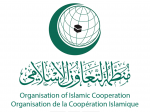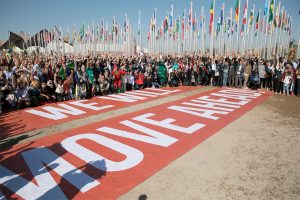 15 April 2016: Heads of State and Government of the Organization of Islamic Cooperation (OIC) welcomed the adoption of the 2030 Agenda for Sustainable Development and its 17 Sustainable Development Goals (SDGs) at the OIC’s 13th Islamic Summit. In the Conference’s Final Communiqué, participants supported actions to address climate change and implement the SDGs, among others.
15 April 2016: Heads of State and Government of the Organization of Islamic Cooperation (OIC) welcomed the adoption of the 2030 Agenda for Sustainable Development and its 17 Sustainable Development Goals (SDGs) at the OIC’s 13th Islamic Summit. In the Conference’s Final Communiqué, participants supported actions to address climate change and implement the SDGs, among others.
The Summit convened from 14-15 April 2016, in Istanbul, Turkey, under the theme, ‘Unity and Solidarity for Justice and Peace.’
The Conference committed to the successful implementation of the SDGs “within the stipulated time frame, taking into consideration the role of national authorities and significance of international cooperation.” Participants suggested using culture and Islamic values as a leverage for sustainable and inclusive development. The Conference also stressed the importance of: access to affordable and clean energy, which relates to SDG 7 (Ensure access to affordable, reliable, sustainable and modern energy for all); integrated water resources management (IWRM), which relates to SDG 6 (Ensure availability and sustainable management of water and sanitation for all); and the water-energy-food nexus approach in achieving sustainable development, which relates to SDGs 6, 7 and 2 (End hunger, achieve food security and improved nutrition and promote sustainable agriculture).
On climate change, the Conference recognized the challenges and global consequences of climate change and environmental degradation, including threats to lives and livelihoods and development aspirations. Participants welcomed the Paris Agreement and underscored the need for global cooperation on climate action, including adequate financing, technology transfer and capacity building support, especially for vulnerable countries, least developed countries (LDCs) and small island developing States (SIDS). The Conference emphasized the importance of the 22nd session of the Conference of the Parties (COP 22) to the UN Framework Convention on Climate Change (UNFCCC) for the follow-up and implementation of the Paris Agreement, and called for operationalization and disbursement of climate financing.
Among many topics, the Conference: emphasized the significance of small and medium enterprises (SME) promotion policies to fight unemployment and poverty and attain sustainable economic growth; called on member States to continue efforts towards quality education that promotes creativity, innovation and research and development; supported further cooperation with the UN Population Fund (UNFPA), the UN Children’s Fund (UNICEF) and the World Health Organization (WHO) on topics such as immunization, control of epidemics and mother and child protection; and welcomed the establishment of the Islamic Organization for Food Security (IOFS) in Astana, Kazakhstan, as a specialized institution of the OIC.
The member States of the OIC are: Afghanistan, Albania, Algeria, Azerbaijan, Bahrain, Bangladesh, Benin, Brunei-Darussalam, Burkina-Faso, Cameroon, Chad, Comoros, Cote d’Ivoire, Djibouti, Egypt, Gabon, the Gambia, Guyana, Guinea, Guinea-Bissau, Indonesia, Iran, Iraq, Jordan, Kazakhstan, Kuwait, the Kyrgyz Republic, Lebanon, Libya, Maldives, Mali, Malaysia, Mauritania, Morocco, Mozambique, Niger, Nigeria, Oman, Pakistan, Qatar, Saudi Arabia, Senegal, Sierra Leone, Somalia, Sudan, Suriname, the Syrian Arab Republic, the State of Palestine, Tajikistan, Turkey, Turkmenistan, Togo, Tunisia, Uganda, the United Arab Emirates (UAE), Uzbekistan and Yemen. [OIC Press Release] [Final Communiqué] [Summit Documents]

